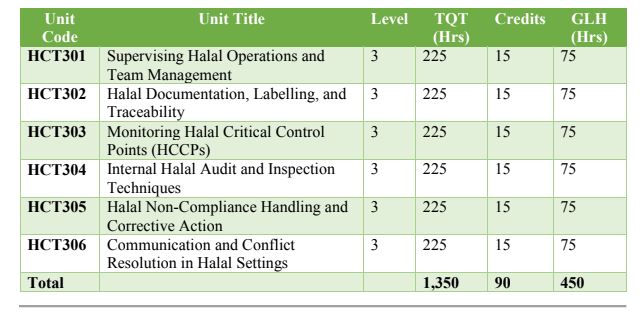Wilmington Metropolitan University
(WMU)
Level 3 Certificate in Halal Certification Training (Supervisor Level)
Total Credits: 90
Total Qualification Time (TQT): 1,350 Hours
Guided Learning Hours (GLH): 450 Hours
1. Introduction
1.1 Why Choose WMU Qualifications?
Wilmington Metropolitan University provides skills-based academic programs aligned with
international standards and real-world expectations. This Level 3 Halal Certification Training
is designed for supervisors to manage halal operations, monitor compliance, and provide
team-level guidance across the halal value chain.
2. Programme Purpose
2.1 Reasons for the Qualification
The halal sector faces growing demand for certified supervisors who can maintain
traceability, manage inspections, and ensure team compliance. This program equips learners
with mid-level halal operation management skills for use in production plants, food
processing, hospitality, and logistics environments.
2.2 Rationale
Supervisors act as the critical link between workers and managers. This qualification
develops applied knowledge in internal auditing, traceability, team oversight, and halal
documentation — crucial for ensuring ongoing halal integrity and smooth audits.
2.3 Aims
To train supervisors in halal documentation and compliance auditing.
To equip learners with knowledge of halal logistics, traceability, and corrective action
protocols.
To foster leadership, communication, and problem-solving in halal operations.
To ensure effective supervision of halal workers and certification requirements.
3. Learning Outcomes
Learners completing the qualification will be able to:
1. Supervise halal-compliant processes and guide frontline teams.
2. Conduct internal inspections and implement corrective measures.
3. Monitor halal traceability and manage documentation protocols.
4. Communicate effectively with both management and workers.
5. Handle minor non-compliance issues in accordance with halal SOPs.
6. Liaise with auditors and certification officers during inspections.
4. Entry Criteria
This program is open to:
Individuals who completed Level 2 Halal Certification or equivalent.
Workers with at least 2 years of experience in halal-related roles.
Candidates with basic literacy and leadership aptitude.
Prior learning or RPL may be accepted based on assessment.
5. Qualification Structure

6. Assessment Strategy
Assessment includes:
o Internal audit simulation,
o Supervisor reports,
o Case studies and team scenarios,
o Written tests and documentation reviews.
Emphasis is on real-world supervisory application and halal compliance integrity.
7. Progression Opportunities
Graduates may progress to:
Level 4 Certificate in Halal Management
Roles as Halal Compliance Officers, Internal Auditors, or Facility Supervisors
Cross-training in HACCP or ISO22000 systems
8. Equality and Inclusion
WMU supports all learners. This program is accessible to qualified individuals of any
background or faith, provided they meet entry standards and respect the halal values
embedded in the training.
9. Unit Descriptors
🔹 HCT301: Supervising Halal Operations and Team Management
Aim: Develop supervisory leadership in halal-compliant environments.
Topics:
Roles and responsibilities of a halal supervisor
Leading worker compliance
Managing shift reports and handovers
Aligning production with halal standards
Motivating and training teams
🔹 HCT302: Halal Documentation, Labelling, and Traceability
Aim: Build capability in recordkeeping and halal traceability systems.
Topics:
Documentation of halal processes
Labelling standards (local and global)
Tracking batch numbers, sources, and certifying bodies
Preventing loss of halal identity in logistics
Use of digital systems and paper logs
🔹 HCT303: Monitoring Halal Critical Control Points (HCCPs)
Aim: Enable supervisors to oversee halal-specific CCPs.
Topics:
Understanding Halal CCPs vs HACCP
Identifying and verifying HCCPs
Recordkeeping and shift-based monitoring
Tools and equipment verification
Escalation protocols
🔹 HCT304: Internal Halal Audit and Inspection Techniques
Aim: Prepare learners to conduct and support internal halal audits.
Topics:
Internal audit planning
Halal audit checklist preparation
Observation, interviewing, sampling
Audit reporting formats
Preparing for external audits
🔹 HCT305: Halal Non-Compliance Handling and Corrective Action
Aim: Address deviations and restore halal status.
Topics:
Types of halal non-compliance
Reporting procedures
Root cause analysis
Documentation of corrective and preventive actions (CAPA)
Revalidation and notification to certifying body
🔹 HCT306: Communication and Conflict Resolution in Halal Settings
Aim: Improve supervisory communication and team conflict handling.
Topics:
Cultural sensitivity in halal facilities
Briefing, coaching, and feedback techniques
Resolving disputes and misunderstandings
Working with multi-ethnic, multi-lingual teams
Reporting to upper management and certification bodies